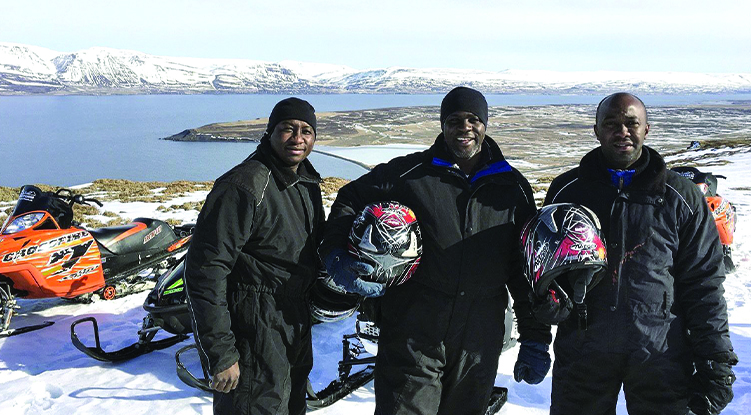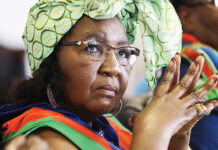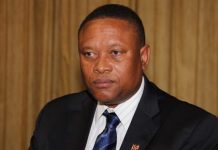By Shinovene Immanuel | 19 November 2019
FISHERIES minister Bernhard Esau, justice minister Sacky Shanghala and Investec Namibia’s managing director, James Hatuikulipi, are the alleged kingpins in a fishing scheme that generated kickbacks of at least N$150 million over four years.
Their names are contained in a trough of emails, payment receipts, invoices and banking details provided by WikiLeaks to The Namibian and other international media organisations, including Al Jazeera’s Investigative Unit and Icelandic National Television.
Documents show that the scheme – linking the governments of Namibia and Angola – involve as much as N$2,5 billion and includes a state-owned company, the National Fishing Corporation of Namibia (Fishcor).
Esau, Shanghala and Hatuikulipi are pinpointed as the masterminds behind a donation of state-to-state fishing licences between 2014 and 2018, but which were used to divert money to individuals in both countries, paid through an Icelandic company.
The paper trail also points to the lobbying of top government officials, a company in Dubai, and kickbacks allegedly paid from an Icelandic-owned company based in the tax haven of Cyprus.
TIES THAT BIND
Former Angolan fisheries minister Victória de Barros Neto and her son, João de Barros, are also named in documents outlining the scheme.
Angolan president João Lourenço fired Neto from the fisheries portfolio in January this year. It’s unclear if the dismissal was related to the Namibian fishing scheme.
Investec Asset Management executive Ricardo Gustavo, who reports to Hatuikulipi, acted as a front for the Angolan government through a company called Namgomar, which received the fishing quota donated by the Namibian ministry of fisheries.
The Namibian reported last month that Gustavo solely runs Namgomar, supposedly a government-to-government joint venture used as a conduit for the licence and quota donations between the governments. Yet, the quotas were eventually exploited by private entities and individuals.
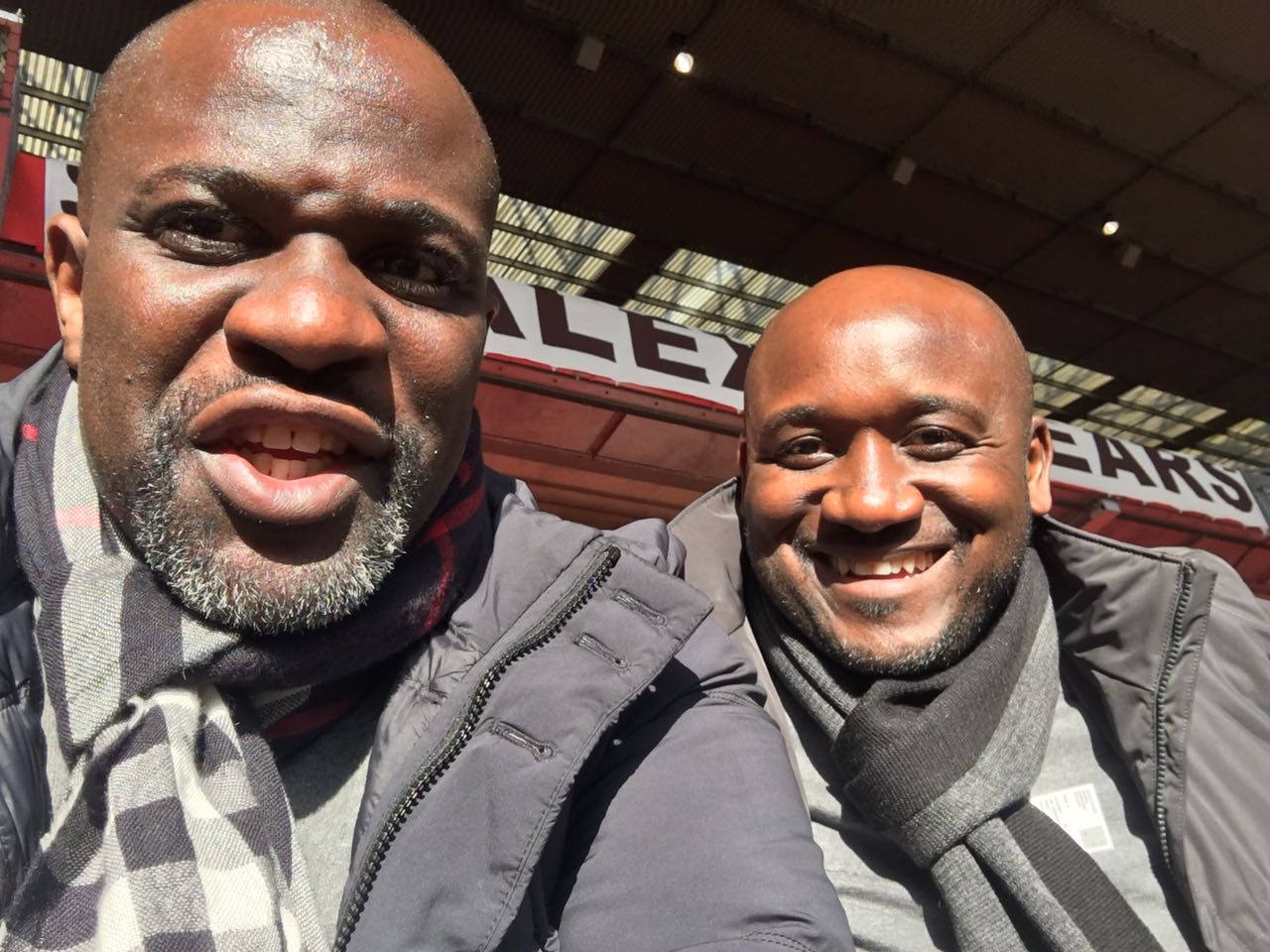
Another businessman mentioned in the documents as a beneficiary of the scheme is Hatuikulipi’s cousin, Tamson ‘Fitty’ Hatuikulipi, who is also Esau’s son-in-law. Fitty Hatuikulipi is married to Esau’s daughter Ndapandula.
At the heart of the kickbacks is a Dubai-registered company, Tundavala, which was used to channel part of the N$150 million in purported “consulting fees”. It is owned by Investec Namibia chief James Hatuikulipi, a long-time friend and business partner of justice minister Shanghala.
Esau and Icelandic seafood company, Samherji HF, have dismissed the information as misrepresentation, a distortion of facts, or false. Esau, who did not answer specific questions, said there was litigation on the matter but did not elaborate.
According to the documents, Namgomar sold the Namibian-donated fishing quotas to Icelandic seafood giant Samherji HF far below the market price. In return for the discount, Samherji allegedly paid kickbacks to the masterminds who made the deal happen through lobbying and designing the scheme.
The kickbacks were titled “consulting fees” and paid to Tundavala, Hatuikulipi’s Dubai outfit.
It was not made clear to The Namibian how the masterminds chose the Icelandic company as a “technical partner”.
The Wikileaks documents include statements, emails, payment receipts, invoices, bank accounts and affidavits made by Icelandic national Jóhannes Stefánsson.
Stefánsson was the managing director of Samherji’s operation in Namibia from 2013 to 2016.
Stefánsson said he was key to the planning and implementation of the Namibia and Angola fishing quota scheme.
He has since blown the whistle on the scheme, revealing how millions of dollars moved between Angola, Dubai, Cyprus, Iceland and Namibia.
The Namibian reported last month that authorities here, such as the Anti-Corruption Commission and the Financial Intelligence Centre, were investigating fishing quota schemes, including the Angolan donation and the National Fishing Corporation of Namibia (Fishcor).
THE GENESIS
The data shows that the relationship among the Namibian masterminds bloomed as early as 2012, two years into Esau’s reign as fisheries minister.
This is where Stefansson entered the picture. As newly appointed managing director of Samherji’s Namibian operations, he travelled and held high-level meetings with the top officials from Namibia and Angola.
“There was a trip to Angola [Luanda] in 2013 with the key people from Namibia and myself, to meet key people in Angola to plan the deal,” Stefánsson said in a statement provided to Namibia’s investigators.
There was also a trip to Iceland late in 2013 with Hatuikulipi, Shanghala, Esau’s son-in-law, Fitty, and the son of the Angolan minister, Joao de Barros.
The visit was to meet Samherji’s top boss, Thorsteinn Már Baldvinsson, one of the seafood company’s main owners and a powerful figure in Iceland.
THE PLOT
Hatuikulipi and justice minister Shanghala impressed upon the Icelanders that they had pulled off a near-impossible deal by lobbying the two governments for a broad licence to fish and for quotas to be issued.
This is laid out in presentations and email correspondence between the Namibians and Icelanders.
In one email exchange on 8 March 2014, Hatuikulipi told the Icelandic business people that he had made sure Esau and his counterpart in Angola, Victória de Barros Neto, secured fishing quotas because “serious political capital is at play”.
Amid the plotting, it wasn’t all smooth-sailing between the African and European partners. In the same email exchange, tension bubbles up with Hatuikulipi accusing Stefánsson of stalling by asking unnecessary questions when the deal was at an advanced stage. He copied in Shanghala and Fitty.
Hatuikulipi chastised Stefánsson for questioning why the Angolan government was demanding an upfront payment of fees and levies before Samherji had even begun fishing and the deal had not been concluded.
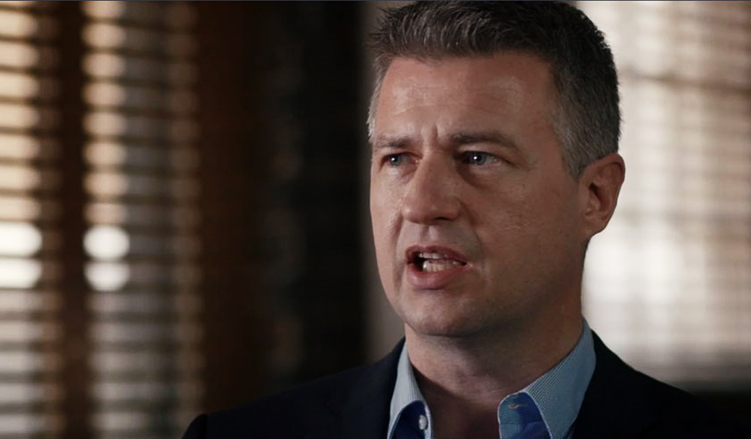
“Hi Johannes,” said the Investec boss. “What is frustrating is that every day you raise a different matter as a concern… we have both ministers in Angola and Namibia working to ensure we gain access to these fishing grounds.
“To come now and raise all these questions after the licence has been issued in Angola is rather a sign that we are doubting the viability of this project, at best, and at worst the minister in Angola may start doubting our commitment and by implication her counterpart minister in Namibia’s referral,” Hatuikulipi said.
“This coming week, the ministers have mobilised state machinery to ensure that the cooperation agreement is in place. The joint permanent commission was prorogued at the instance of the two ministers of Namibia and Angola,” he added.
“There is serious political capital at play, and I trust you appreciate that. This strategy has the ability to grant our partnership a fishing right to exploit marine resources in Namibia, at a time when applications could otherwise not be entertained. This is a window of opportunity,” he said.
“I am happy you have copied your superiors. We need to take resolute decisions tomorrow. We have reputations to protect,” he wrote.
TOO LATE TO WITHDRAW
Hatuikulipi seemed unable to contain his annoyance with Stefánsson as the email exchange continued.
“I have to be honest with you, I feel disappointed that we travelled to Angola to investigate the opportunity and lobby for quotas. We have gone to see the highest office in fisheries in Angola with support from Namibia. Now that the quota has been issued, we are getting cold feet.
“I think it’s too late now to withdraw from the process and the reputational damage will be too much and this will have implications for you in Namibia. You will come across as non-committal as a partner.
“Can we please set up a teleconference call tomorrow with you? This matter is urgent. I will speak to Sacky [Shanghala] as well,” he said.
Shanghala was chairperson of the Law Reform and Development Commission at the time. Later, as attorney general, he helped change the law to give minister Esau greater powers to dispense fishing licences.
As law reform chief, Shanghala produced a report focusing on how Namibia could improve its fishing industry.

After the parties seemed to have blown off steam, Stefánsson emailed Hatuikulipi setting out that the kickbacks would be paid to the Namibians quarterly –– 25% to be paid at the end of March 2014, then June, September and December.
“We need to negotiate in the best interest for the project. It’s a big sum to be paid and we need to be 100% sure about all matters towards Mr Thorsteinn [Már Baldvinsso] and that we are working for the best interest for Samherji and our partners.”
Stefánsson provided information stating that about N$148 million was paid from the Icelandic fishing company to the Namgomar masterminds: 2014 [N$21 million], 2015 [N$20 million], 2016 [N$39 million], 2017 [N$39 million] and N$29 million last year.
Anatomy of a Deal
On 24 June 2014, Esau and his former Angolan counterpart De Barros Neto signed the bilateral agreement, on behalf of their two countries.
The agreement allowed Namibia to donate fishing quotas of horse mackerel (also known as maasbanker) to its northern neighbour, using a private company.
On the same day a joint venture called Namgomar Pesca Namibia was registered in Namibia.
The Business and Intellectual Property Authority (Bipa) lists Investec Namibia’s Gustavo as the only director of Namgomar Namibia.
Stefansson now says: “This bilateral agreement was done to create income for key people in Namibia and Angola, but mostly in Namibia.”
Namibia was deemed “easy to sell and get money [from fishing quotas] but in Angola it is not so profitable to catch horse mackerel quota,” Stefansson said.
The Wikileaks documentation further states that the bilateral agreement was designed because Namibia’s fisheries minister had no powers at the time to issue fishing quotas to non-right holder companies. But the state-to-state agreement could circumvent such an obstacle.
Namibia thus donated the fishing quota to the Angolan government, but directly to the private firm, Namgomar, on 17 July 2014.
“I have the pleasure to inform you that the minister [Esau] has approved the allocation of 7 000 metric tonnes of horse mackerel to your company,” then fisheries permanent secretary Ulitalah Hiveluah wrote in a letter to Gustavo.
“This quota allocation is made as part of the Namibia-Angola bilateral agreement,” she added.
The Tundavala Equation
THE choice of the name Tundavala for an investment company is an interesting one, perhaps even odd.
There is an escarpment called the Tundavala Gap, 18 kilometres west of Lubango, in Angola’s Huila province. Wikipedia’s description of Tundavala says: “The altitude at the rim exceeds 2 200m, while the plain below is approximately 1 200m lower, which creates a rather impressive view, encompassing a distance of tens of kilometres.”
While the cliff provides stunning views, it has a notorious history of extrajudicial killings and disappearances of opponents by pre-colonial dynasties, through to Portuguese colonialists and post-independent governments.
For Namibians who disappeared in the Lubango dungeons, it is alleged Tundavala was the end of their lives.
The Namibian quoted the National Society for Human Rights in 1999, saying it had unearthed circumstantial evidence that hundreds of Namibians who were detained and tortured by Swapo disappeared and could have been dumped in the Tundavala Mountain crevice.
Businessman Hatuikulipi, who registered Tundavala Invest Limited on 24 May 2014 in Dubai, would not say what made him choose the name. He is close to the Swapo leadership, which is considered as responsible for the torture and disappearances.
Documents suggest he is the sole director, sole shareholder and company secretary of Tundavala.
Stefansson said in one of his statements to the Namibian authorities that it was decided in August 2014 that the Icelandic company, Samherji, would pay around 75% of the “usage fee” of the Namangor fishing quota to Tundavala Invest Ltd in Dubai.
The meeting was allegedly attended by Hatuikulipi with Samherji top officials, including Baldvinsson. The company declined to answer specific questions but issued a statement that is reported here.
The kickbacks were allegedly for “the key people of Namibia” as reward for landing the fishing quotas. Money would be paid from one of Samherji’s related companies in Cyprus, Esja Seafoods.
Cyprus and Dubai are tax havens known to hide the flow of money.
An agreement was signed between Namgomar and Esja Holding (Pty) Ltd (owned by Samherji) in August 2014 to catch the Namgomar Pesca fishing quota for 10 years [2014 to 2023].
However, Esja Holding would pay “consulting fees” to Tundavala.
For “consulting fees”, Tundavala slapped Esja with an invoice of US$350 000 [N$5 million] on 31 October 2014. Another invoice was sent by Hatuikulipi’s firm to Esja on 26 January 2015 for US$447 488 [N$6,6 million]; and another on 31 March 2015, asking for US$256 500 [N$3,8 million].
Emails show that Stefánsson processed and/or approved these payments.
Stefansson said Namgomar’s quota was sold for N$500 per tonne, while the market value at that time was around N$2 000 to N$2 500 per tonne.
“The other 75% should be paid outside of Namibia to the Dubai company, Tundavala Invest Ltd from Samherji´s companies in Cyprus (Esja Seafood Ltd and others). This is done to hide the money as it’s never declared in Namibia,” the whistle-blower said.
Emails show that João de Barros (son of the former Angolan fisheries minister), benefited from the Namgomar
FRONTING
More evidence indicating that the state’s fish donation to Angola was being used as a front emerged in later email correspondence.
A presentation seemingly produced by Namibians for the Icelandic company was shared via email on 20 August 2014, from Shanghala to people such as Stefánsson, James Hatuikulipi, Fitty and Icelandic fishing company chief, Baldvinsson.
It was made a month after Esau signed the agreement with his counterpart in Angola and appears to be meant to woo the Icelanders.
Titled ‘Namgomar opportunity presentation to Mr Torsteinn’, the presentation maps out the scheme. It states that benefiting from fishing quotas would not have worked unless the Namibian government came up with an agreement with Angola.
“We have achieved it,” the Namibians boast in one of the slides.
“Period: Five years, renewable in perpetuity unless one country cancels the agreement.”
Another slide: “No need to re-apply (no expiry, diplomatic relevance).”
Yet another slide: “The opportunity we have in Angola and Namibia is not available to everyone. Before everyone wakes up, we need to move and make [an] impact. This will protect both ministers.”
Slide: “We need to ensure that in Angola and Namibia, even if government/minister changes, there will be no need to touch the arrangement but to ensure that quota is issued.”
“Therefore, we need to prepare a plan for Angola and manage the Angolan partners and their expectations.”
*This article is produced byThe Namibian investigative unit in partnership with WikiLeaks, Icelandic National Broadcasting Service (RUV), Al Jazeera and the Icleandic daily newspaper Stundin.

